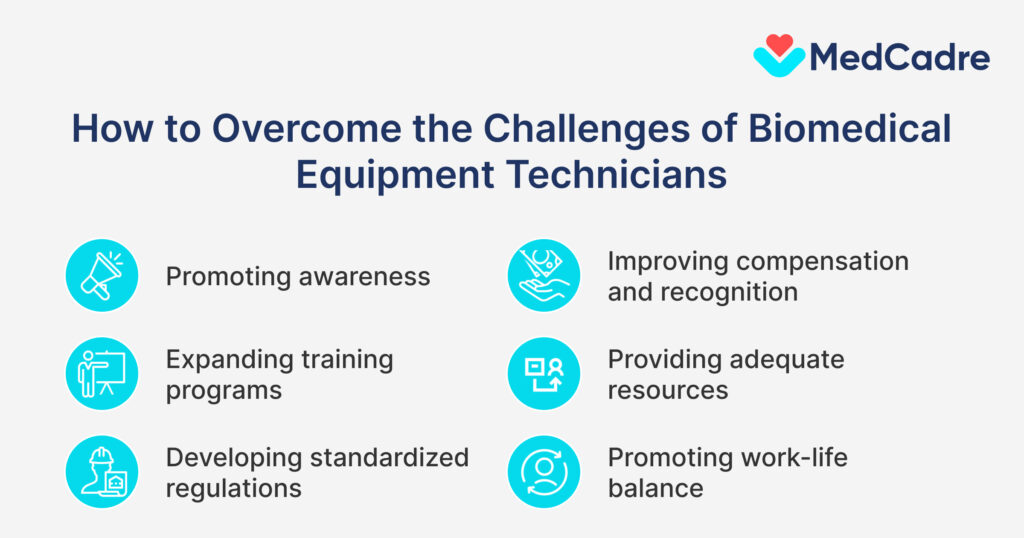The healthcare sector has undergone several challenges; biomedical equipment technicians are no exception. Biomedical technicians in the healthcare industry are an integral part of the function. Biomedical technicians are, therefore, the most sought-after profession in the healthcare sector in the current scenario. In this blog, we will show you the professionals’ challenges and how to overcome them.
Let’s understand the importance of the profession first!
What is Biomedical Equipment?
Biomedical Equipment is related to medical instruments used in medicine, biology, and pharmacology. Biomedical equipment is associated with several chemical and biological processes for patient care.
The equipment is designed to help medical specialists detect diseases so that doctors can apply life-saving drugs to eradicate the diseases from patients’ lives.
In short, the instruments save lives by detecting diseases and helping doctors provide better patient care.
Biomedical equipment technicians are in high demand in the modern healthcare scenario. The equipment technicians, however, must be skilled and qualified to perform the tasks.
The Challenges of Biomedical Equipment Technicians
Biomedical Equipment Technicians (BMETs), also known as Biomedical Engineering Technicians or Biomedical Equipment Specialists, play an essential role in the healthcare industry by ensuring that medical equipment is properly maintained, repaired, and calibrated.
The challenges, however, exist in the sector, which sometimes hamper the quality of service. Medical equipment technician is an essential position in any healthcare organization. So, the challenges are inevitable as the industry is massive in volume, and the importance is undeniable.
Despite the vital role the medical equipment technician plays in hospitals, clinics, etc., the equipment technicians also face the following challenges:
1. Rapid Technological Advancements:
The healthcare industry constantly evolves, introducing new and increasingly complex medical devices regularly. This necessitates BMETs to continually upskill and acquire new knowledge to stay updated and maintain these devices effectively. It can be a daunting task, requiring continuous learning and dedication.
2. Shortage of Skilled Workforce:
There is a growing gap between the demand for skilled BMETs and the available qualified workforce. This is due to various factors, including a need for more awareness about the BMET career path, limited training programs, and an aging workforce nearing retirement. This shortage strains healthcare facilities and can lead to equipment maintenance and repair delays, potentially impacting patient care.
3. Lack of Standardization and Regulations:
There is no standardized national certification or licensing requirement for BMETs in the United States. This inconsistency can lead to skill levels and competency variations across healthcare facilities. Additionally, the lack of clear regulations can make it difficult for BMETs to navigate liability and risk management issues.
4. Inadequate Compensation and Recognition:
Despite their critical role in ensuring patient safety and equipment functionality, BMETs often need more compensation and recognition than other healthcare professionals. This can lead to low morale and motivation, further contributing to the workforce shortage.
5. Limited Resources and Budget Constraints:
Healthcare facilities often operate on tight budgets, leading to limited resources for BMETs. This can include restricted access to training opportunities, outdated equipment, and insufficient personnel, making it challenging for them to perform their duties effectively.
6. Stressful Work Environment:
BMETs often work long shifts and face pressure to maintain equipment uptime while adhering to strict safety regulations. They may also be exposed to stressful situations, such as equipment malfunctions that could affect patient care. This can lead to burnout and job dissatisfaction.
How to Overcome the Challenges of Biomedical Equipment Technicians in the Healthcare sector
There are multiple ways to eradicate the challenges of biomedical equipment technicians. Let’s learn the ways to overcome the issues:

- Promoting awareness: Raising awareness about the BMET career path through educational campaigns and outreach programs can attract more individuals to the field.
- Expanding training programs: Increasing the accessibility of BMET training programs can help address the workforce shortage.
- Developing standardized regulations: Implementing national certification or licensing requirements for BMETs can ensure consistent competency standards across the healthcare industry.
- Improving compensation and recognition: Offering competitive salaries and benefits can improve BMET job satisfaction and attract and retain talent.
- Providing adequate resources: Allocating good resources, including training opportunities, modern equipment, and sufficient personnel, can enable BMETs to function effectively.
- Promoting work-life balance: Implementing initiatives to reduce stress and encourage work-life balance can improve BMET well-being and retention.
The demand for Biomedical Equipment Technicians in the healthcare industry
There is a significant demand for equipment technicians in the industry. As post-Covid health has become a serious concern for everyone, biomedical equipment technicians are highly needed in the US healthcare sector.
Let’s show the statistics about the demand for biomedical technicians.
| Year | Job Opening in the US |
| 2023 | 9,400 |
| 2024 | 9,600 |
| 2025 | 9,900 |
| 2026 | 10,200 |
| 2027 | 10,500 |
| 2028 | 10,800 |
| 2029 | 11,100 |
| 2030 | 11,400 |
Biomedical equipment technicians are likely to grow 13% from 2020 to 2030. The growth is driven by many measures, such as the aging population, advancements in medical technology, increased focus on patient safety, and many others.
The job opportunities for biomedical equipment technicians in several US states
Various factors drive the job opportunities as biomedical equipment technicians in several US states. The following measures are essential to take your stand as a job seeker –
Salary – Salaries for BMETs vary depending on location, experience, and specialization. Generally, salaries are higher in states with a higher cost of living and higher demand.
Cost of Living: The cost of living is a crucial factor to consider when choosing a location. States with a high demand for BMETs may also have a higher cost of living.
Career Advancement: Some states may offer better opportunities for career advancement in specific specialties or areas of focus within the BMET field.
High Demand States:
- California: With a large and aging population, California has a high demand for BMETs. Major metropolitan areas like Los Angeles, San Francisco, and San Diego offer numerous opportunities in hospitals, research institutions, and medical device companies.
- Texas: Texas has the second-highest number of BMET jobs in the US. The state’s growing population and expanding healthcare industry create a strong demand for skilled technicians. Opportunities are concentrated in major cities like Dallas, Austin, and Houston.
- Florida: Florida’s aging population and thriving healthcare industry lead to a high demand for BMETs. Hospitals, retirement communities, and medical device companies offer numerous job opportunities across the state.
- New York: New York has many BMET jobs due to its large and concentrated population and a well-developed healthcare system. Opportunities are available in hospitals, research institutions, and medical device companies in major cities like New York City and Buffalo.
- Pennsylvania: Pennsylvania’s strong healthcare industry, particularly in Philadelphia and Pittsburgh, creates a high demand for BMETs. Opportunities are available in hospitals, clinics, and medical device manufacturers.
If you are a biomedical equipment technician looking for a suitable placement, you must visit platforms like MedCadre to receive a call from your employer.
How does MedCadre help biomedical equipment technicians in securing jobs?
MedCadre is one of the leading platforms that assist you in finding a job as a biomedical equipment technician in the healthcare sector. As finding a job would be a tedious task and consider a few measures, MedCadre will do all these on your behalf.
MedCadre has expert and dedicated professionals who will always assist you in finding your dream job in the US healthcare industry.
After receiving the updated CV, we scrutinized the documents and placed you in your field. The process is simple and easy.
In what way does MedCadre help you?
MedCadre is the most promising platform for job seekers like you. You must submit your updated CV so we can scrutinize and connect you with your employer. We have an extensive pool of job openings in the healthcare sector and contractual and permanent positions for various posts.
Based on your qualifications, certifications, and previous experience, we will help you find the best job.
Share your updated CV with us!
If you still have queries, check our FAQs.
Frequently Asked Questions
How do I get a job via MedCadre?
MedCadre will help you find the best placement, as we have a significant pool of job openings for several positions. Once you share your CV, our expert panel will scrutinize it. Based on your qualifications and expertise, we will help you to get the right job.
Can I refer my friend to you?
Yes. You can refer your friend to us. You both will get similar service from us.
Is experience or certification necessary to accept my CV to MedCadre?
We accept all kinds of CVs. However, it depends on the position you are looking for; if the job requires previous experience and certifications, you must meet the criteria to receive a call from the employer.
In Conclusion
Biomedical equipment technicians are in high demand. The equipment technicians, however, are facing several industry challenges. Despite the shortcomings, there are also ways to deal with the issues. If you are a biomedical technician looking for a job, visit the MedCadre platform and submit your updated CV to receive a call.


